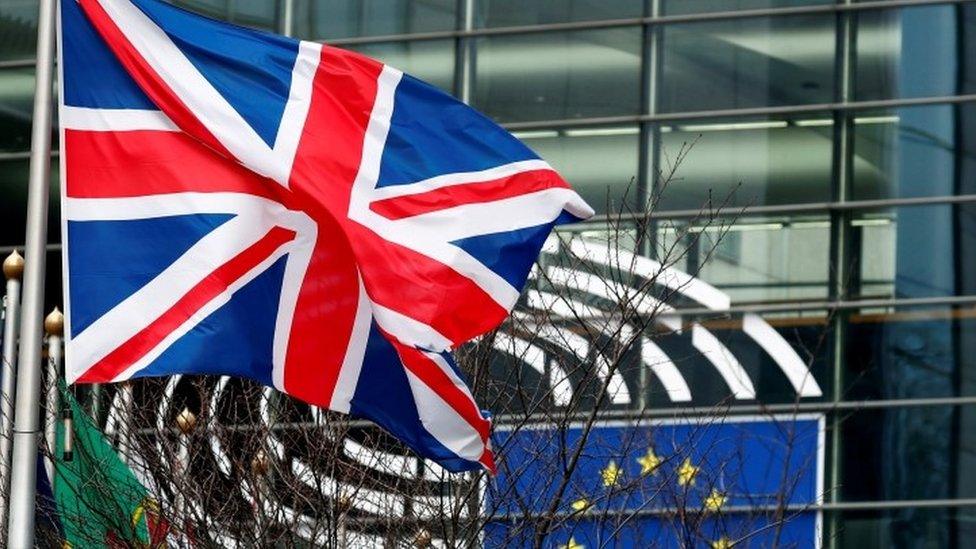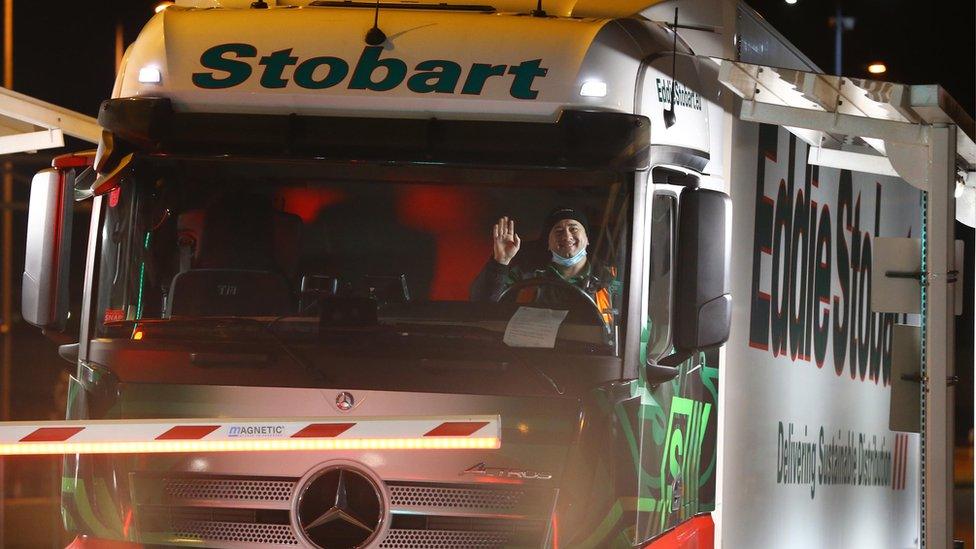Brexit: New era for UK as it completes separation from European Union
- Published

A new era has begun for the United Kingdom after it completed its formal separation from the European Union.
The UK stopped following EU rules at 23:00 GMT, as replacement arrangements for travel, trade, immigration and security co-operation came into force.
Boris Johnson said the UK had "freedom in our hands" and the ability to do things "differently and better" now the long Brexit process was over.
But opponents of leaving the EU maintain the country will be worse off.
Scottish First Minister Nicola Sturgeon, whose ambition it is to take an independent Scotland back into the EU, tweeted, external: "Scotland will be back soon, Europe. Keep the light on."
BBC Europe editor Katya Adler said there was a sense of relief in Brussels that the Brexit process was over, "but there is regret still at Brexit itself".
The first lorries arriving at the borders entered the UK and EU without delay.
On Friday evening, Transport Secretary Grant Shapps tweeted that border traffic had been "low due to [the] bank holiday", external but there had been no disruption in Kent as "hundreds" of lorries crossed the Channel with a "small" number turned back.
Six freight loads travelling from Holyhead in Wales to Ireland had to be turned away due to not having the correct paperwork, the Stena Line ferry and port group said on Friday morning.
But later on Friday, the group said freight traffic was flowing well through its ports and government customs systems were working well.
It added that the fall in freight traffic after the Christmas and Brexit stockpiling period meant "it is too early to draw any conclusions", but the company remained "cautiously optimistic that, as freight volumes begin to rise again, we will be able to ensure the continued free movement of goods".
UK ministers have warned there will be some disruption in the coming days and weeks, as new rules bed in and British firms come to terms with the changes.
But officials have insisted new border systems are "ready to go".
As the first customs checks were completed after midnight, Eurotunnel spokesman John Keefe said: "It all went fine, everything's running just as it was before 11pm."
Northern Ireland has different arrangements from other parts of the UK, meaning there will be some customs checks on goods moving between Great Britain and the province.
On Friday afternoon, the first ferry from Great Britain operating under the terms of Northern Ireland trading protocol docked in Belfast, on schedule at 13:45 GMT.
Seamus Leheny, policy manager at Logistics UK, said six out of the 15 lorries that were on the first ship to arrive into Belfast were brought in for inspection, with one being kept at the port for more than three hours.
"Inevitably there are going to be teething problems because with such a new, complex system as this there are going to be issues in the first few days," he told BBC Radio 4's PM programme.

The first lorry loads on to the Eurotunnel shuttle after the UK left the single market and customs union
Mandy Ridyard, whose aerospace components company makes daily shipments to Northern Ireland, told BBC Radio 4's World at One programme she was "filling in the same declaration to send goods to the Philippines that I am sending them within the UK".
"And obviously that all adds a lot of cost to my business."
The UK officially left the 27-member political and economic bloc on 31 January, three and half years after the UK public voted to leave in the 2016 Brexit referendum.
But it stuck to the EU's trading rules for 11 months while the two sides negotiated their future economic partnership.
A treaty was finally agreed on Christmas Eve, and became law in the UK on Wednesday.
Under the new arrangements, UK manufacturers will have tariff-free access to the EU's internal market, meaning there will be no import taxes on goods crossing between Britain and the continent.
But it does mean more paperwork for businesses and people travelling to EU countries, while there is still uncertainty about what will happen to banking and services.
The UK and Spain have also reached an agreement meaning the border between Gibraltar and Spain will remain open.
Fabian Picardo, Gibraltar's chief minister, said the deal still needed to be formalised, but by abolishing controls between Gibraltar and the EU's passport-free Schengen area, he said it would prevent queues at the border "which make people's lives a misery and make business difficult".


It is a moment that some will regard with huge optimism, others with deep regret.
And while this historic move happens at a moment in time, the impact, in some areas, may be less instant or obvious than others - for example, it's expected there'll be relatively little traffic at Dover on the first day of 2021 as new border checks kick in.
Nevertheless, significant changes are here - whether on trade, travel, security or immigration - and those changes could well become more apparent in the months ahead.

Mr Johnson - who took the UK out of the EU in January six months after becoming prime minister - said it was an "amazing moment" for the UK in his New Year message.
Laura Kuenssberg challenges Boris Johnson on Brexit and vaccines
Writing in the Daily Telegraph,, external he added that the combination of the Brexit deal and rollout of the Oxford vaccine means "we are creating the potential trampoline for the national bounceback".
Lord Frost, the UK's chief negotiator, tweeted that Britain had become a "fully independent country again".
And the deputy chairman of the pro-Brexit European Research Group of Tory backbench MPs, David Jones, told the BBC: "We can now say clearly Britain is a sovereign and independent state."
Allow X content?
This article contains content provided by X. We ask for your permission before anything is loaded, as they may be using cookies and other technologies. You may want to read X’s cookie policy, external and privacy policy, external before accepting. To view this content choose ‘accept and continue’.
But opponents of Brexit say the country will be worse off than it was while it was a member of the EU.
Ireland's Foreign Minister Simon Coveney said, external it was "not something to celebrate" and the UK's relationship with Ireland will be different from now on, but "we wish them well".
French President Emmanuel Macron said the UK remained a "friend and ally", but he added that the choice to leave the EU was "the child of European malaise and many lies and false promises".


In Brussels, there is a sense of relief the Brexit process is over, but there is regret still at Brexit itself.
Basically, the European Union thinks that Brexit makes it - the EU - and the UK weaker.
But the EU view is this is less bye-bye Britain and more au revoir, because there are so many loose ends between the two sides.
For example, there are the ongoing practicalities surrounding Gibraltar, the UK is still waiting to find out what access Brussels is going to give its financial services to the single market, there is cooperation on climate change, and there is a reviewal mechanism written into the treaty for every five years.
For all of those reasons and more, this is not the end of the EU-UK conversation for the foreseeable future.

What is changing?
The culmination of the Brexit process means major changes in different areas. These include:
The free movement of people between the UK and EU countries has ended - and has been replaced in the UK by a "points-based" immigration system, external
Anyone from the UK who wants to stay in most of the EU for more than 90 days in any 180-day period now needs a visa
Duty-free shopping has returned,, external with people coming back to the UK from the EU able to bring up to 42 litres of beer, 18 litres of wine, four litres of spirits and 200 cigarettes without paying tax
EU citizens wanting to move to the UK (except those from Ireland) face the same points-based system as people elsewhere in the world
UK police have lost instant access to EU-wide databases on criminal records, fingerprints and wanted persons.

